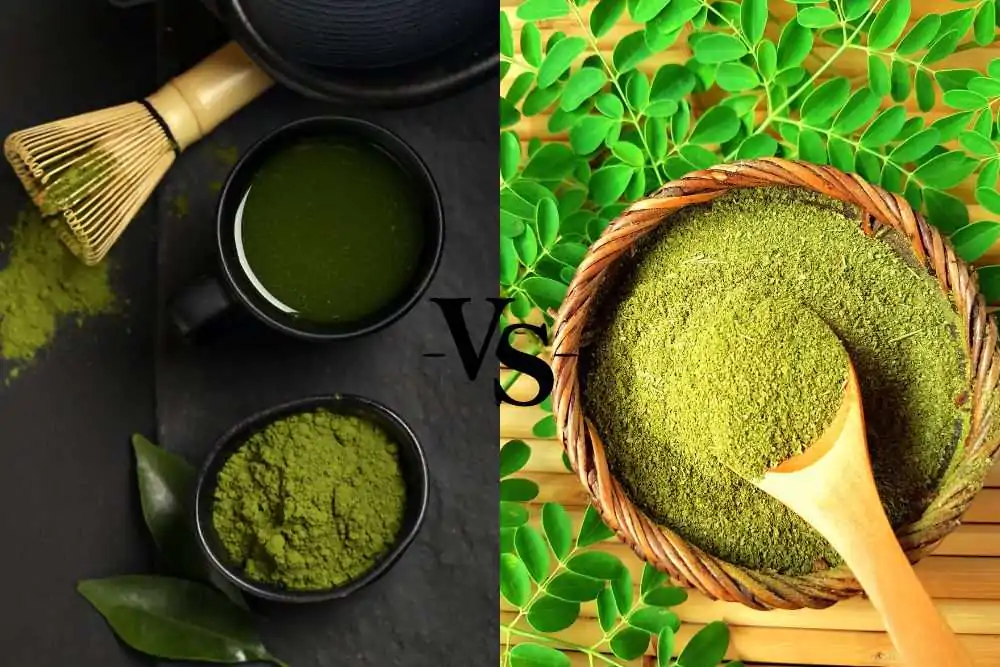“Unlock ultimate wellness with Green Power: Premium Moringa Leaf Powder. Rich in nutrients for energy, immunity, and health. Elevate your daily routine naturally.”
Introduction to Green Power
In the quest for better health and natural supplements, one superfood has risen above the rest: Moringa Oleifera, known as the “miracle tree.” Its leaves, when ground into powder, offer an astounding array of nutritional benefits, earning Moringa leaf powder the title of “Green Power.”
Table of Contents
What is Moringa?
The tree is remarkable for its ability to thrive in challenging environments and poor soil, making it a boon for communities in arid and nutrient-deficient regions. Every part of the Moringa tree can be used for various purposes. Its leaves, seeds, bark, flowers, and roots serve not only as sources of food but also for their therapeutic properties.
Nutritional Profile: Moringa leaves are a powerhouse of nutrition. They are rich in vitamins A, C, and E, calcium, potassium, and protein. The leaves contain essential amino acids, antioxidants, and anti-inflammatory compounds. This makes Moringa an excellent supplement for combating malnutrition and boosting overall health.
Medicinal Uses: Traditionally, Moringa has been used in herbal medicine to treat a wide array of conditions such as anemia, asthma, digestive disorders, and skin problems. Modern research is exploring its potential in treating diseases like diabetes, heart conditions, and inflammation, though more scientific evidence is needed to conclusively prove these benefits.
Environmental Impact: Beyond its health benefits, Moringa plays a vital role in environmental sustainability. It helps in soil conservation, water purification, and as a natural pesticide, making it valuable not only in nutrition and health but also in ecological balance and agricultural practices.
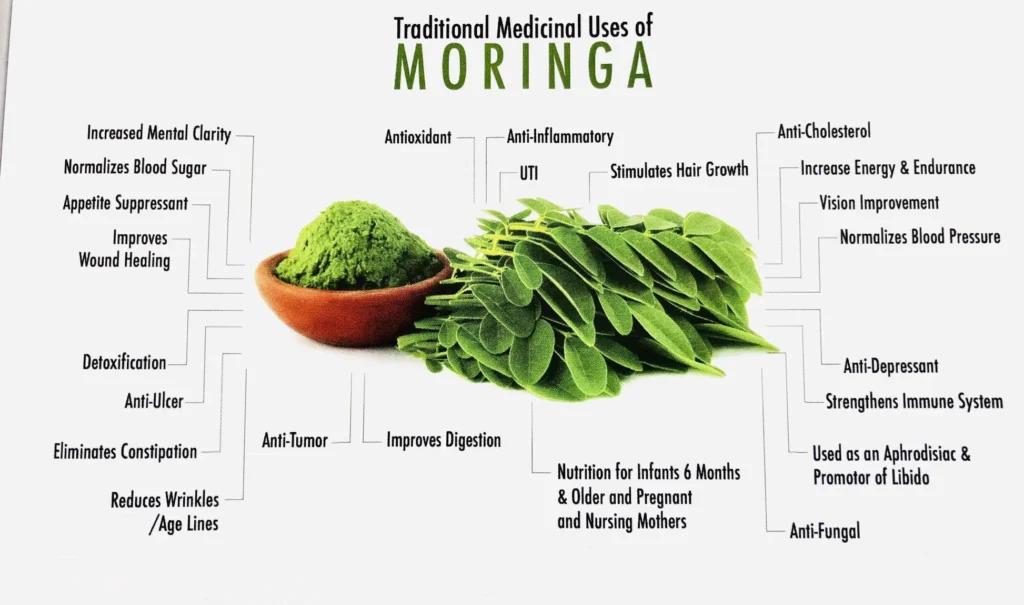
Health Benefits of Moringa Leaf Powder
- Rich in Nutrients: Moringa leaf powder is highly nutritious, containing significant amounts of vitamins A, C, and E, calcium, potassium, and iron. It also offers protein and a variety of phytonutrients, essential for maintaining overall health.
- Antioxidant Powerhouse: Moringa powder is loaded with antioxidants such as quercetin and chlorogenic acid. Antioxidants fight free radicals in your body, reducing oxidative stress and lowering the risk of chronic diseases like heart disease and diabetes.
- Supports Immune Function: The high vitamin C content in Moringa leaf powder helps boost immunity. Additionally, its bioactive compounds have antibacterial, antifungal, and antiviral properties, further supporting the body’s defense against infections.
- Promotes Heart Health: Moringa powder can contribute to heart health by reducing cholesterol levels and preventing the formation of plaque in the arteries, thereby reducing the risk of heart disease.
- Anti-inflammatory Effects: The isothiocyanates in Moringa are known for their anti-inflammatory properties. Chronic inflammation is linked to many health issues, and incorporating Moringa powder into your diet can help manage inflammation.
- Enhances Digestive Health: Moringa leaf powder has a natural laxative effect that can help improve digestion. Its fiber content supports a healthy digestive system, and its antibacterial properties can help inhibit the growth of various pathogens.
- Supports Brain Health: Moringa is believed to support brain health due to its antioxidant and neuro-enhancer activities. It may also improve brain function in areas like memory, mood, and reaction times due to its high content of vitamins E and C.
- Helps in Managing Diabetes: Some studies suggest that Moringa powder may help lower blood sugar levels, which is beneficial for people with diabetes. Its chlorogenic acid content helps in moderating blood sugar levels post meals.
- Improves Energy Levels: Moringa powder is a rich source of iron and vitamin A, nutrients that are essential for the metabolism and preventing fatigue. Incorporating it into your diet can help improve your energy levels.
- Enhances Skin and Hair Health: The high antioxidant content of Moringa powder protects the skin and hair from oxidative damage, promoting healthier skin and hair. It can also be used topically as part of skincare routines.
- Bone Health: With its impressive array of minerals, including calcium and magnesium, Moringa powder supports the maintenance and development of healthy bones.
- Detoxification: Moringa has detoxifying effects, helping to cleanse the body of toxins, thanks to its ability to purify water and its high fiber content, which aids in digestion.
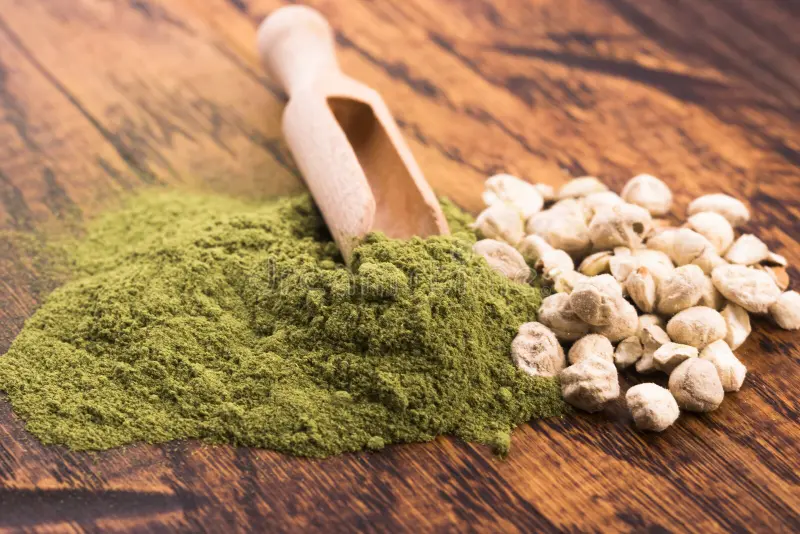
How to Use Moringa Leaf Powder
1. Smoothies and Juices
Adding a teaspoon or two of Moringa powder to your smoothies or juices is an easy way to boost their nutritional content. Its mild flavor blends well with most ingredients, enhancing the drink’s benefits without overpowering its taste.
2. Teas and Drinks
You can make a simple Moringa tea by stirring a teaspoon of Moringa powder into hot water. For added flavor, mix Moringa powder into herbal teas or warm beverages like milk. Honey, lemon, or ginger can be added for taste.
3. Soups and Sauces
Moringa leaf powder can be mixed into soups and sauces to increase their nutritional value. Add the powder towards the end of the cooking process to preserve its vitamins and minerals.
4. Baked Goods
Incorporate Moringa powder into your baking by adding it to bread, muffins, or pancake batters. It gives your baked goods a nutritional boost and a beautiful green hue.
5. Salads and Salad Dressings
Sprinkle Moringa powder over salads or mix it into salad dressings for an extra dose of nutrients. It pairs well with both vegetable salads and fruit salads.
6. Seasoning
Use Moringa powder as a seasoning for meats, vegetables, or rice dishes. It adds a subtle flavor and enriches your meals with vitamins and minerals.
7. Energy Bars and Snacks
For a quick and nutritious snack, add Moringa powder to homemade energy bars, granola bars, or protein balls. It’s an excellent way to enhance the health benefits of your snacks.
Dosage Recommendations
The recommended daily amount of Moringa powder can vary depending on the individual’s age, health status, and nutritional needs. Generally, starting with 1 teaspoon per day and gradually increasing to 2 teaspoons is a safe approach for most adults. It’s important to listen to your body and adjust the amount accordingly.
Precautions
While Moringa leaf powder is considered safe for most people, it’s essential to consume it within recommended limits. Pregnant and breastfeeding women should consult a healthcare professional before adding Moringa to their diet. Additionally, individuals on medication should discuss with their doctor to avoid potential interactions.
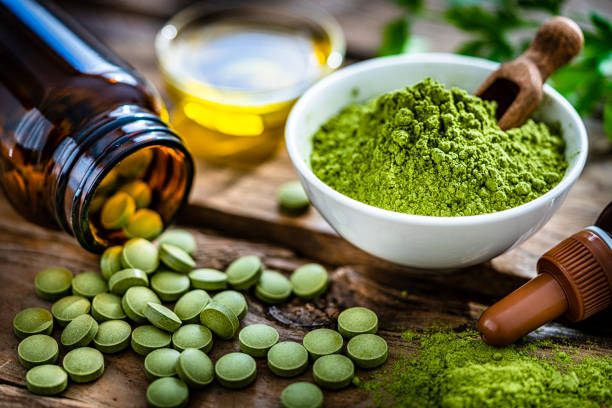
Choosing the Right Moringa Leaf Powder
1. Organic Certification
Look for Moringa leaf powder that is certified organic. This ensures the Moringa trees were grown without the use of synthetic pesticides or fertilizers, reducing your exposure to harmful chemicals.
2. Source
Consider the source of the Moringa powder. Moringa grown in its native environment, typically in parts of Africa and Asia, is likely to have a richer nutrient profile. Products that disclose their source are often more transparent about their quality and farming practices.
3. Processing Method
The method used to process Moringa leaves into powder can significantly affect its nutrient content. Opt for Moringa powder that is gently dried and ground. High temperatures and harsh processing methods can degrade nutrients, so cold-pressed or low-temperature dried powders are preferable.
4. Purity
Choose a product that is 100% Moringa leaf powder without fillers, additives, or preservatives. Some products may be mixed with other substances to cut costs, which can dilute the nutritional benefits and introduce unwanted ingredients into your diet.
5. Lab Testing
Reputable brands often perform lab testing on their products to check for heavy metals, bacteria, and other contaminants. Look for products that provide transparency about their testing protocols and results to ensure safety and quality.
6. Packaging
Good packaging is essential to preserve the quality and efficacy of Moringa leaf powder. Opt for products that are packaged in airtight, opaque containers to protect the powder from light and moisture, which can degrade its quality over time.
7. Reviews and Recommendations
Research reviews and recommendations from other consumers and health professionals. Feedback from others who have used the product can provide insight into its effectiveness and quality.
8. Brand Reputation
Consider the reputation of the brand selling Moringa powder. Brands that are committed to sustainability, ethical sourcing, and high-quality products are generally more trustworthy.
9. Price
While price shouldn’t be the only determining factor, it can be an indicator of quality. Extremely low-priced products may be a sign of poor quality or unethical production practices. However, the most expensive option isn’t always the best either. Look for a product that offers a good balance between quality and price.
10. Certifications and Standards
Check for any additional certifications, such as non-GMO, gluten-free, or vegan, if these are important to you. These certifications can further assure the product’s quality and alignment with your dietary preferences or restrictions.
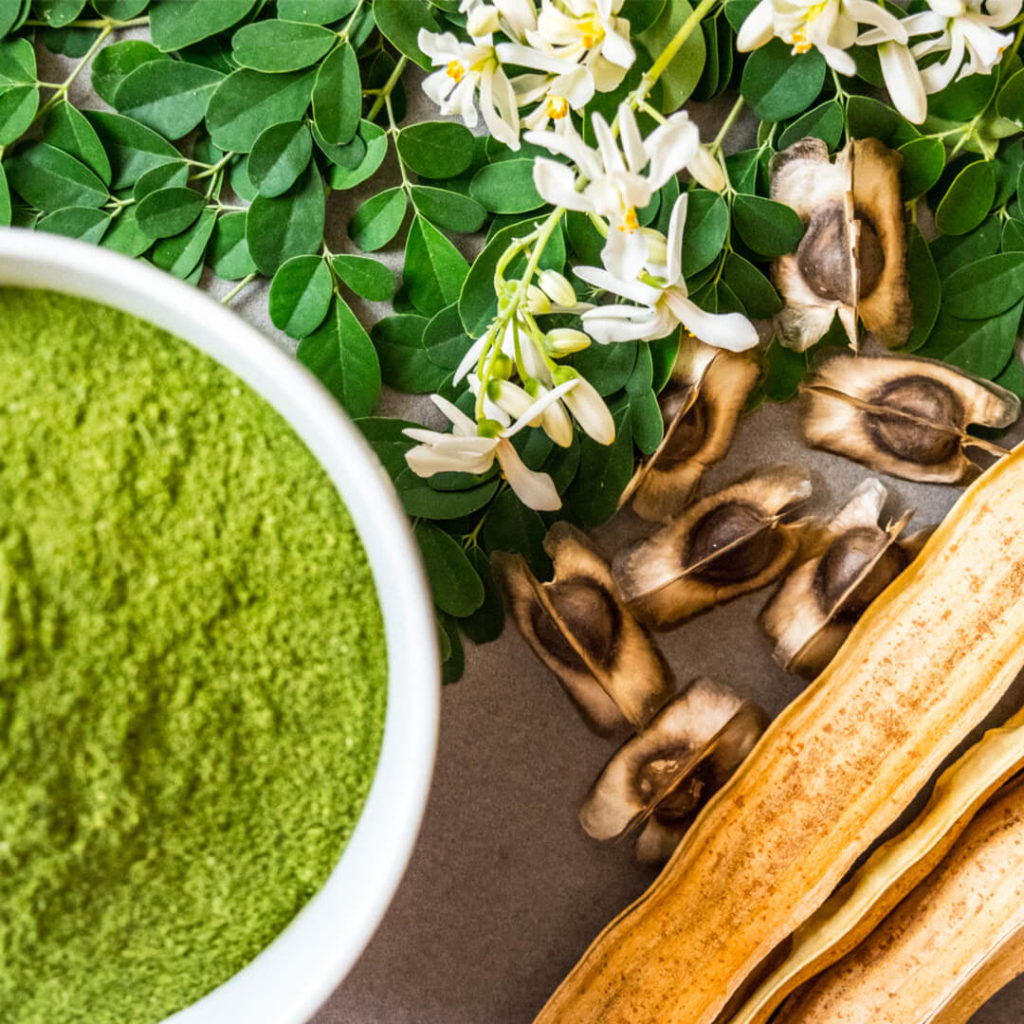
Moringa Leaf Powder in Your Daily Routine
1. Start Your Day with a Moringa Smoothie
Blend Moringa powder into your morning smoothie for a nutritious start to your day. Combine it with fruits like bananas, berries, and mangoes for a delicious and energizing drink. Adding a tablespoon of Moringa powder to your smoothie can boost your intake of vitamins, minerals, and antioxidants.
2. Moringa Tea or Latte
Make a warm cup of Moringa tea or a Moringa latte as a healthy alternative to coffee. Simply mix a teaspoon of Moringa powder into hot water or your choice of milk (dairy or plant-based). Sweeten with honey or maple syrup and add a dash of cinnamon or ginger for extra flavor.
3. Boost Your Breakfast
Sprinkle Moringa powder over your breakfast cereal, oatmeal, or yogurt. Its subtle flavor blends well, and it’s an easy way to increase the nutritional value of your first meal of the day.
4. Energy Bars and Snacks
Incorporate Moringa powder into homemade energy bars, granola, or protein balls. Mix it with nuts, seeds, oats, and your choice of sweeteners to create a nutritious snack that’s perfect for on-the-go energy.
5. Supercharge Your Soups and Salads
Add Moringa powder to soups, stews, and salads. It’s a simple way to enrich your meals with additional vitamins and minerals without significantly altering the taste.
6. Healthy Baking
Use Moringa powder in your baking recipes. It can be added to bread, muffins, pancakes, and other baked goods to boost their health benefits. Moringa can add a vibrant green color and a nutritional punch to your treats.
7. Enhance Your Main Dishes
Mix Moringa powder into pasta sauces, curries, and vegetable dishes. Its mild taste won’t overpower your meals but will enhance their nutritional profile.
8. Create Nutritious Dressings and Sauces
Whisk Moringa powder into salad dressings, dips, and sauces. Whether it’s a vinaigrette or a creamy dip, Moringa can add valuable nutrients and a hint of flavor.
9. Refreshing Beverages
Stir Moringa powder into water with lemon and mint for a refreshing and healthful drink. It’s a great way to stay hydrated and get a dose of antioxidants throughout the day.
10. Pre- or Post-Workout Drink
Mix Moringa powder with your pre- or post-workout shake to aid recovery and provide a boost of energy. Its high protein content and essential amino acids help in muscle repair and growth.
General Tips:
- Start Small: If you’re new to Moringa, begin with a small amount (about half a teaspoon) and gradually increase to avoid digestive discomfort.
- Consistency is Key: Regular consumption is essential to experience the full benefits of Moringa. Try to incorporate it into your diet daily.
- Quality Matters: Ensure you’re using high-quality, organic Moringa leaf powder to avoid contaminants and maximize health benefits.
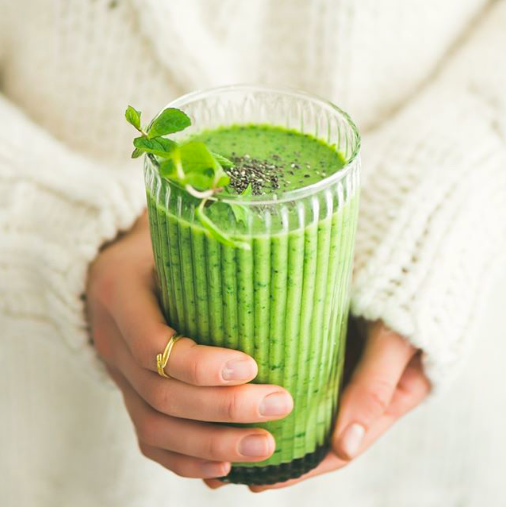
Testimonials and Success Stories
Energy and Vitality Boost
Alex, a fitness instructor: “After adding Moringa powder to my morning smoothies, I noticed a remarkable increase in my energy levels throughout the day. It has become my go-to for sustained energy without the jitters I got from coffee.”
Improved Digestive Health
Samantha, a health blogger: “Struggling with digestion issues for years, I started incorporating Moringa powder into my diet. Within weeks, I experienced improved digestion and less bloating. It’s now a staple in my kitchen.”
Weight Management
John, an office worker: “Incorporating Moringa powder into my meals helped me in my weight loss journey. It made me feel fuller for longer periods, reducing my cravings and overall calorie intake.”
Skin Health Transformation
Maria, a skincare enthusiast: “I began using Moringa powder both in my diet and as a face mask. My skin has never looked better! Its glow and clarity improved, and even my acne scars have faded.”
Enhanced Immune Function
Linda, a teacher: “Since I started using Moringa powder daily, I’ve noticed I get sick less often, even during flu season. It’s been a great immune booster for me.”
Blood Sugar Control
Rahim, diagnosed with type 2 diabetes: “My blood sugar levels have become more stable after including Moringa powder in my diet. My doctor was impressed with the improvement in my readings.”
Cardiovascular Health
Elena, a retiree: “After learning about Moringa’s heart health benefits, I decided to give it a try. My cholesterol levels have improved, and my doctor is pleased with my heart health progress.”
Increased Focus and Mental Clarity
Tom, a graduate student: “Moringa powder has been a game-changer for my study sessions. I’ve experienced increased focus and mental clarity, making it easier to prepare for exams.”
Joint Pain Relief
Karen, an arthritis sufferer: “Adding Moringa powder to my diet has helped reduce my joint pain and inflammation. It’s helped me become more active again.”
Nutritional Supplement for Vegetarians
Anita, a vegetarian: “Finding a plant-based source of iron and calcium was challenging until I discovered Moringa powder. It’s been an excellent addition to my vegetarian diet.”
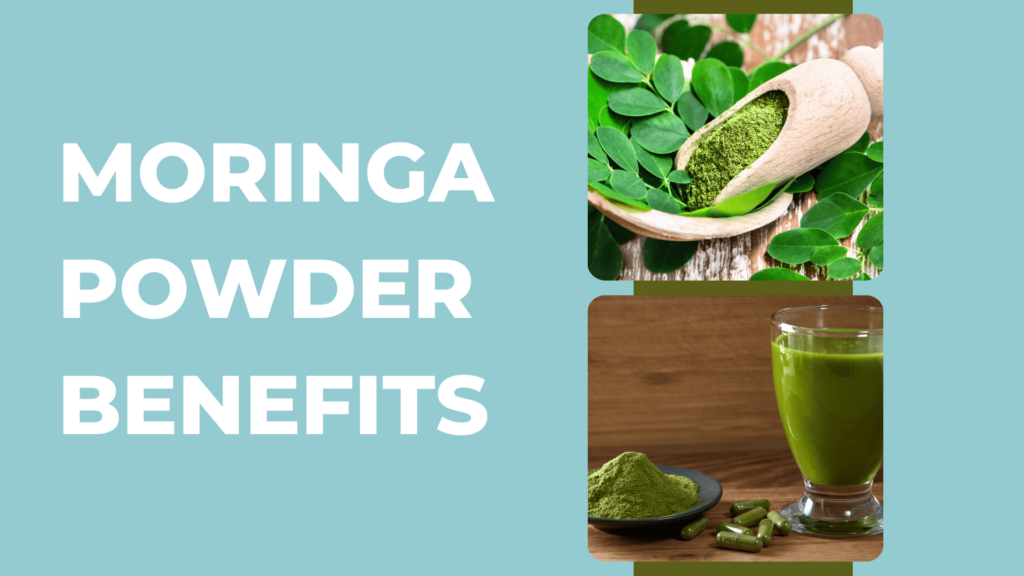
Precautions and Side Effects
Precautions
- Pregnancy and Breastfeeding: There’s insufficient reliable information about the safety of using Moringa in medicinal amounts during pregnancy or breastfeeding. It’s best to stay on the safe side and stick to food amounts.
- Diabetes: Moringa leaf powder may lower blood sugar levels. If you have diabetes and are taking Moringa, monitor your blood sugar closely. It might require adjusting your diabetes medications.
- Blood Pressure: Moringa has been found to lower blood pressure. This could be a benefit to many, but if you’re already taking blood pressure medication, it could cause your blood pressure to go too low.
- Liver Function: High doses of Moringa may not be safe for people with liver conditions, as it can potentially increase liver enzyme levels, indicating liver damage.
- Interaction with Medications: Moringa can potentially interact with certain medications, such as those for diabetes and high blood pressure, by enhancing their effects. It may also interact with thyroid medications. Always consult with a healthcare provider before starting Moringa if you are on medication.
Side Effects
- Digestive Issues: Consuming large amounts of Moringa powder may cause digestive side effects such as stomach upset, gas, or diarrhea. Start with small amounts to see how your body reacts.
- Allergic Reactions: Although rare, some people might be allergic to Moringa. Symptoms could include rash, itching, or swelling. If you experience these symptoms, stop using Moringa and seek medical attention.
- Toxicity from Seeds: While Moringa leaf powder is generally safe, consuming the seeds in large quantities can be harmful due to certain chemicals they contain.
- Dizziness and Fatigue: Some individuals have reported feeling dizzy or fatigued after consuming Moringa, which could be due to its blood pressure-lowering effects.

General Advice
- Start with Small Doses: To minimize the risk of side effects, start with small amounts of Moringa leaf powder and gradually increase to the recommended dosage.
- Consult Healthcare Providers: If you have any underlying health conditions or are pregnant, breastfeeding, or taking medication, consult a healthcare provider before adding Moringa to your diet.
- Quality Matters: Ensure you’re using a high-quality, pure Moringa leaf powder without contaminants or fillers, which could contribute to adverse effects.
Comparing Moringa to Other Superfoods
Moringa vs. Spirulina
Nutritional Profile:
- Moringa is rich in vitamins A, C, and E, calcium, potassium, and iron. It also offers a significant amount of protein, fiber, and antioxidants.
- Spirulina is a type of blue-green algae that provides a concentrated source of protein, vitamins B1, B2, and B3, iron, magnesium, potassium, and copper. It’s also high in antioxidants.
Health Benefits:
- Both Moringa and Spirulina are excellent for boosting energy levels, supporting immune function, and improving overall health. Moringa’s high vitamin and mineral content support bone health, skin health, and provide anti-inflammatory benefits. Spirulina is renowned for its detoxifying properties, especially in removing heavy metals from the body, and enhancing endurance and stamina.
Usage and Taste:
- Moringa powder has a mild, earthy taste that can be easily incorporated into smoothies, soups, and baked goods without significantly altering the flavor.
- Spirulina has a strong, seaweed-like flavor that might be overpowering for some, making it less versatile in recipes compared to Moringa.
Moringa vs. Matcha
Nutritional Profile:
- Matcha is a type of green tea that’s rich in catechins, a type of antioxidant known for its cancer-fighting properties. It’s also high in caffeine and L-theanine, which can enhance alertness and calmness simultaneously.
- Moringa’s nutritional profile is more diverse in terms of vitamins and minerals, offering a broad spectrum of health benefits.
Health Benefits:
- Matcha’s antioxidants can help reduce the risk of heart disease and improve metabolic health, while its caffeine content boosts energy and focus.
- Moringa’s benefits are more comprehensive, affecting everything from reducing inflammation and blood sugar levels to improving digestive health and boosting the immune system.
Usage and Taste:
- Matcha is typically consumed as a tea or added to lattes, smoothies, and desserts. It has a unique, umami-rich taste that’s become popular worldwide.
- Moringa’s versatility in terms of culinary use is broader, given its mild flavor, making it easier to add to a wide variety of dishes.
The Environmental Impact of Moringa Cultivation
1. Low Water Requirement
Moringa trees are incredibly drought-resistant, thriving in arid and semi-arid regions where water scarcity is a significant challenge. Their ability to grow with minimal water makes them an excellent crop for sustainable agriculture practices, especially in areas vulnerable to drought and climate change.
2. Soil Conservation and Improvement
Moringa trees help in soil conservation by preventing erosion with their extensive root systems. They can also improve soil quality through the decomposition of their leaves, which enrich the soil with nutrients. This natural fertilization supports the health of the surrounding flora and improves agricultural productivity.
3. Carbon Sequestration
Like other trees, Moringa trees absorb carbon dioxide from the atmosphere during photosynthesis, contributing to the mitigation of greenhouse gas emissions. This carbon sequestration capability is crucial in the fight against climate change, making Moringa cultivation a beneficial practice for the environment.
4. Biodiversity Support
Moringa trees can enhance biodiversity in their cultivation areas. They provide a habitat and food source for a variety of organisms, including birds, insects, and microorganisms, thus supporting ecological balance.
5. Purification of Water
Moringa seeds have a remarkable ability to purify water. They contain a protein that can bind to impurities and sediments in the water, causing them to coagulate and settle. This natural purification method is invaluable for providing clean drinking water in developing countries, reducing reliance on chemical water purifiers.
6. Sustainable Livelihoods
Moringa cultivation can contribute to sustainable livelihoods in rural communities. It offers a source of income through the sale of Moringa products like leaves, seeds, and oil. Additionally, it provides nutritional benefits to local populations, enhancing food security.
7. Energy Production
The oil extracted from Moringa seeds, known as Ben oil, can be used as a biofuel. This renewable energy source offers an environmentally friendly alternative to fossil fuels, further highlighting the sustainability aspect of Moringa cultivation.
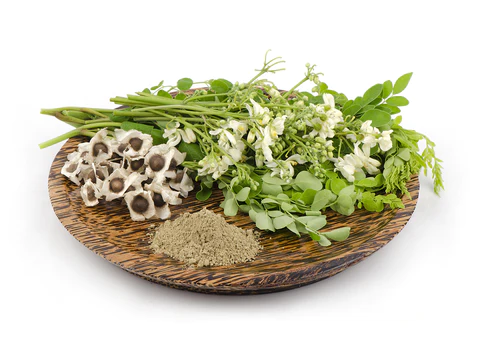
Future of Moringa
1. Nutritional Security
As the global population continues to grow, so does the need for sustainable, nutrient-rich food sources. Moringa, with its high nutritional value, is well-positioned to address issues of malnutrition and food insecurity, especially in developing countries. Its ease of cultivation and ability to grow in harsh conditions make it an ideal crop for enhancing nutritional security.
2. Health and Wellness Industry
The demand for natural and organic supplements is on the rise, with more people seeking out holistic approaches to health. Moringa’s rich nutrient profile and health benefits, from reducing inflammation to improving metabolic health, place it at the forefront of this trend. As research continues to uncover its potential health benefits, Moringa is likely to become a staple in the health and wellness industry.
3. Pharmaceutical Research
Emerging research suggests that Moringa could have medicinal properties, including anti-inflammatory, antiviral, and anticancer effects. Future pharmaceutical research may focus on isolating and harnessing these compounds to develop new medications for a range of conditions, potentially increasing Moringa’s value and applications in medicine.
4. Sustainable Agriculture and Environmental Conservation
Moringa’s low water requirement and ability to improve soil quality make it an excellent crop for sustainable agriculture practices. Its cultivation can contribute to reforestation and combat desertification, making it a key player in environmental conservation efforts. Additionally, the use of Moringa seeds for water purification offers an eco-friendly solution to water scarcity and pollution.
5. Renewable Energy
With the ongoing search for sustainable energy sources, Moringa oil (extracted from its seeds) presents a viable option for biofuel production. Its growth in the renewable energy sector could reduce reliance on fossil fuels, contributing to efforts against climate change.
6. Global Trade and Economic Growth
As awareness of Moringa’s benefits grows, so does its potential for global trade. Developing countries, where Moringa is native, can capitalize on this opportunity for economic growth by exporting Moringa products to international markets. This could lead to job creation and sustainable development in rural areas.
7. Innovation in Food and Beverage Industry
Moringa is increasingly being incorporated into a variety of food and beverage products, from health bars and teas to smoothies and cooking ingredients. Its versatility and nutritional benefits make it an attractive ingredient for innovation in the food industry, with potential for expanded use in both developed and developing markets.
Source to Get Organic Moringa Leaf Powder Capsules
FAQs
1. What is Moringa, and why is it considered a superfood?
Moringa Oleifera, commonly known as Moringa, is a tree native to parts of Africa and Asia. It’s considered a superfood due to its rich content of vitamins, minerals, antioxidants, and plant compounds. Moringa leaves, which are often ground into powder, contain high levels of vitamin A, C, and E, calcium, potassium, and protein, supporting a wide range of health benefits.
2. How can Moringa leaf powder be incorporated into the diet?
Moringa leaf powder is highly versatile and can be added to smoothies, juices, teas, soups, sauces, and baked goods. It can also be sprinkled on salads or mixed into salad dressings. Starting with a small dose, like a teaspoon, and gradually increasing can help your body adjust to its potent nutrients.
3. Are there any side effects of consuming Moringa?
While Moringa is safe for most people when consumed in moderate amounts, it can cause digestive side effects like stomach upset or diarrhea in some cases, especially when consumed in large quantities. Pregnant and breastfeeding women should avoid taking Moringa in medicinal amounts due to a lack of safety information.
4. Can Moringa help with specific health conditions?
Moringa has been studied for its potential in treating various health conditions, including diabetes, hypertension, inflammation, and malnutrition, due to its antioxidant, anti-inflammatory, and nutrient-dense profile. However, more research is needed to conclusively determine its effectiveness for these conditions.
5. How does Moringa compare to other superfoods like Spirulina or Matcha?
While all these superfoods offer significant health benefits, Moringa is unique in its comprehensive range of nutrients, including a high vitamin and mineral content. Unlike Spirulina and Matcha, Moringa also provides a significant amount of calcium and iron, making it particularly beneficial for bone health and preventing anemia.
6. Is Moringa environmentally sustainable?
Yes, Moringa is considered environmentally sustainable due to its drought resistance, ability to grow in poor soil without the need for chemical fertilizers, and its role in soil conservation and water purification. Moringa cultivation can contribute positively to environmental sustainability efforts.
Conclusion
Moringa leaf powder is a versatile, nutrient-rich supplement that can enhance your wellness routine. Its wide range of health benefits makes it a must-try for those seeking natural ways to boost their health.
